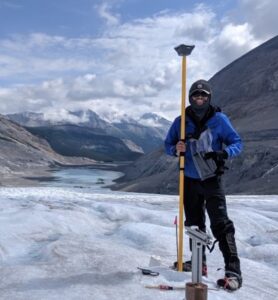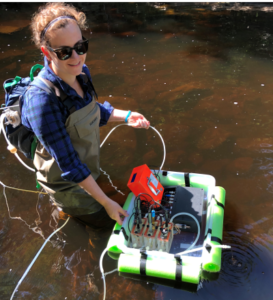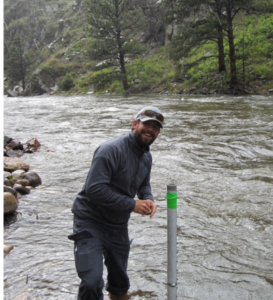UW–Madison has long been recognized as one of the premier hydrogeology research universities in the nation. It was here that some of the foundations of the field of hydrogeology were established in the late-19th and early-20th centuries. This tradition of excellence continues today: in the most recent ranking of geology graduate programs by US News, UW–Madison is tied for seventh. Alumni of the program have gone on to highly successful careers in the academic, government and private sectors.
Faculty and students in the UW-Madison Hydrogeology research program are engaged in both the applied and fundamental research in hydrogeology. Research interests within the program are diverse and fall under the general categories of groundwater flow, solute and contaminant transport, pore-scale transport processes, groundwater remediation and numerical modeling. Many research projects crosscut these categories and utilize a range of laboratory, field, and modeling tools.
Collaboration with UW researchers in departments other than Geoscience, particularly Geologic Engineering and Civil & Environmental Engineering, are common. There is also significant collaboration between the UW Hydrogeology program and researchers at the Wisconsin Geological and Natural History Survey (WGNHS) and the Middleton office of the US Geological Survey (USGS-Middleton), both of which are located in the Madison metro area.
Hydrogeology Program Overview
Hydrogeology Courses and Course Requirements
Graduate students from the Hydrogeology program are broadly trained hydrogeologists with the skills needed to tackle a diversity of water resource challenges. In developing an individualized coursework plan, graduate students in the Hydrogeology Program are expected to work with their advisory committee to ensure they have achieved both breadth and depth in hydrological knowledge.
The courses listed below represent common guidelines for students in the program.
Core Course Offerings
| Course Number | Course Title | Generally Offered |
| GEOSCI/GLE-627 | Hydrogeology | Every Fall |
| GEOSCI/GLE-629 | Contaminant Hydrogeology | Every Spring |
| GEOSCI/GLE-724 | Groundwater Flow Modeling | Spring (alternating years) |
| CEE-310 | Fluid Mechanics | Spring |
| CEE-412 | Groundwater Hydraulics | Spring |
| CEE-415 | Hydrology | Fall |
| GLE/CEE-511 | Mixing and Transport in the Environment | Spring (alternating years) |
| CEE-515 | Hydroclimatology for Water Resources Management | Spring (alternating years) |
| CEE-500 | Water Chemistry | Fall |
| GLE/CEE-612 | Ecohydrology | Every Spring |
Depending on a student’s background and research focus, students may take courses in statistics, computer science, civil engineering, material science, etc.
| Course Number | Course Title | Last Offered | Previous Topics Examples |
| CEE-619 | Special Topics in Hydrology | Spring 2014 | Hydroclimatology, Hydroecology |
| GEOSCI-727 | Advanced Hydrogeology | Spring 2014 | Finite Element Modeling, Numerical Contaminant Transport Modeling |
| GEOSCI-729 | Field Methods in Hydrogeology | Summer 2012 | |
| GEOSCI-929 | Seminar in Hydrogeology | Spring 2013 | Geostatistics, Wetland Hydrogeology, Groundwater / Surface Interactions |
Other relevant courses
As an inherently interdisciplinary and multi-faceted field, Geoscience graduate students often take several courses outside of the Geoscience Department. The list below is a small sampling of the many classes that graduate students from the Hydrogeology program have taken in the past. An excellent resource for other water-related coursework is the University’s Water@UW-Madison website. Current students can also visit the University CourseGuide (UW login required).
CEE 700 – Chemistry of Natural Water
CEE 502 – Environmental Organic Chemistry
Math 319 – Techniques in Ordinary Differential Equations
CEE 716 – Statistical Modeling of Hydrologic Systems
CEE 330 – Soil Mechanics
Soil Sci 622 – Soil Physics
Landscape Arch 361 – Wetlands Ecology
Zoo 315/316 – Limnology
IES 710 – Field Investigations in Wetland Ecology
Law 845 – Water Rights Law
CEE 357 – An Introduction to Geographic Information Systems
CEE 635 – Remediation Geotechnics
Soil Sci 523 – Soil Microbiology and Biochemistry
BSE 571 – Small Watershed Engineering
BSE 372 – On-site Waste Water Treatment and Dispersal
Special topics courses, field methods courses, and seminars are offered routinely, but with less regularity. Hydrogeology graduate students are often expected to take these courses when they become available.
Hydrogeology-related theses completed by students within the department often have hydrogeology program faculty members as their primary advisors, though some students may also complete hydrogeology-related theses working under other advisors. In these cases, students often have hydrogeology faculty member on their thesis committee
Recent Theses
(*Advisor is in the hydrogeology program, unless otherwise specified)
| Year | Author | Advisor* | Degree | Thesis Title |
| 2019 | Christenson, Catherine | Cardiff | M.S. | Big Data for Small Streams: Establishing a method for collection of spatially and temporally dense water-quality and geophysical datasets via canoe |
| 2018 | Patterson, Jeremy R. | Cardiff | M.S. | Understanding constraints on geothermal sustainability through reservoir characterization at Brady geothermal field, Nevada |
| 2017 | Andelman, Elliott | Cardiff | M.S. | Multi-sourced geologic data integration: A time-based approach |
| Heinle, Benjamin | Cardiff | M.S. | The Impact of Surface Heterogeneities on Fracture Flow and Transport Processes: Visualizations using a Novel Thermochromic Laboratory Apparatus | |
| Krause, Jacob | Cardiff | M.S. | A tracer approach to estimate groundwater nitrate loading from agricultural fields: Application to a shallow sand and gravel aquifer | |
| Olson, Joshua | Bahr | M.S. | Long-term alterations in groundwater chemistry induced by municipal well pumping | |
| Schlaudt, Elisabeth | Bahr | M.S. | Developing a groundwater flow model for slough management in Sauk County, WI | |
| 2016 | Sayler, F. Claire | Cardiff | M.S. | Characterization of bedrock secondary porosity using Multi-frequency Oscillatory Flow Interference testing |
| Zhao, Hangjian | Bahr | M.S. | Evaluating seepage lake drought resilience using stable isotopes of water and groundwater-flow models | |
| Zhou, YaoQuan | Cardiff | Ph.D. | Oscillatory hydraulic tomography : numerical experiments and laboratory studies | |
| 2015 | Baldwin, Jonathan A. | Wang | M.S. | Developing a Multichannel Analysis of Surface Waves (MASW) method for application to Distributed Acoustic Sensing (DAS) array and co-located seismometers at Garner Valley, California |
| Sellwood, Stephen | Bahr | Ph.D. | Characterization of groundwater flow in sandstone aquifers using heat as an in-well tracer | |
| 2014 | Castongia, Ethan E. | Wang | M.S. | An experimental investigation of Distributed Acoustic Sensing (DAS) on lake ice |
| Haserodt, Megan J. | Bahr | M.S. | Effects of roads on groundwater flow patterns in peatlands and implications for nearby salmon streams on the Kenai Peninsula, AK | |
| Li, Yang | Cardiff | M.S. (GLE) | Using multiple conceptual models to understand transboundary groundwater flows in Red Cliff Reservation, WI | |
| 2013 | Meulemans, Ashley J. | Wang | M.S. | Tomographic imaging of mine-induced stress changes in North Aurora, Illinois |
| Potier, Chelsea E. | Wang | M.S. | Subsurface tiltmeter observations of solid earth tides and rock excavation in Northeastern Illinois | |
| Pruitt, Aaron H. | Bahr | M.S. | Potential impacts of climate change on groundwater/surface water interaction, Chequamegon-Nicolet National Forest, Wisconsin | |
| 2012 | Dunkle, Kallina M. | Anderson | Ph.D. | Preferential flow paths in heterogeneous glacially deposited aquitards |
| Gellasch, Christopher A. | Bahr | Ph.D. | Vulnerability of urban public supply wells in fractured siliciclastic aquifer systems |
Older theses for the last several decades are compiled in a Google sheet.
Recent Graduate Research Projects in Hydrogeology
 M.S. Advisors: Luke Zoet, Mike Cardiff
M.S. Advisors: Luke Zoet, Mike Cardiff
Ph.D Advisor: Mike Cardiff
cjroland@wisc.edu
@WaterAndHazards
B.S. Hydrogeology, University of Texas at Austin, 2016
M.S. Geology, UW-Madison, 2020
Research topics: hydrogeology, geomorphology, geomechanics, geothermal energy
Methods: UAV observations, numerical modeling, field characterization
My goal is to improve humanity’s understanding of processes at the intersections between social and environmental systems and implement best-practice science to achieve better societal outcomes in fields ranging from hydrogeology and hydrology to geomorphology. I am also passionate about science communication and education.
I am pursuing a Ph.D. with Professor Mike Cardiff studying the stress state of a geothermal reservoir in the Southwestern U.S. using pressure, temperature, and deformation observations and numerical models that incorporate coupled physics including hydrologic, thermal, and geomechanical processes. Building a better understanding of the spatial distribution of subsurface effective stress in geothermal fields, and the transient response of stress distributions to changes in field operation, will advance our ability to economically produce energy from these reservoirs and mitigate associated hazards like induced seismicity. For a brief overview of this project see here.
Previously, I earned an M.S. with Luke Zoet and Mike Cardiff studying the transient response of coastal bluffs along Wisconsin’s Lake Michigan coastline to variable temperature and hydrologic forcings. High water levels in the Laurentian Great Lakes are causing widespread erosion of unlithified coastal bluffs and damaging infrastructure, and improving our understanding of bluff failure mechanisms will assist with projections of coastal change. We found that volumetric bluff erosion rates in the late-winter and early spring are 3-4 times higher than during the summer. We hypothesize that much of this increase is due to the impact of freeze-thaw processes. Specifically, bluff-face freezing drives transient pore pressure increases that destabilize the bluff, leading to accelerated mass wasting. I also had the opportunity to spend a month camping out in front of a glacier studying glacial seismicity response to hydrologic forcing.
Recent Presentations
C.J Roland, L. Zoet, J.E. Rawling, M. Cardiff, 2020. Freeze/thaw processes drive seasonal mass wasting on cold-region coastal bluffs: example from a case study in Southeastern Wisconsin. North Central Geological Society of America Annual Meeting, Online. May 18-19, 2020. https://gsa.confex.com/gsa/2020NC/meetingapp.cgi/Paper/347701
N. Stevens, C.J. Roland, D. Hansen, E. Schwans, L. Zoet. Basal seismicity forced by surface-water supply on a stepped-bed glacier: Saskatchewan Glacier, Alberta, Canada. European Geophysical Union Annual Meeting, Online. May 4-8, 2020. https://meetingorganizer.copernicus.org/EGU2020/EGU2020-10952.html
C.J Roland, C. Volpano, L. Zoet, J.E. Rawling, M. Cardiff, 2019. Quantifying and Modeling Bluff Erosion Along Wisconsin’s Lake Michigan Coastline. Geological Society of America Annual Meeting, Phoenix, Arizona. September 22-25, 2019. https://gsa.confex.com/gsa/2019AM/meetingapp.cgi/Paper/339123
 Advisor: Mike Cardiff
Advisor: Mike Cardiff
cchristenso4@wisc.edu
B.S. Geology, Carlton College, 2015
M.S. Geology, UW–Madison, 2018
My current research interests fall in the realm of socio-hydrology, specifically how public perception of hydrogeologic issues compare to perception within the scientific community. I am curious about how we as scientists can better understand public perception to improve our communication of science. I am working on a few projects related to these ideas. The first is funded through the Wisconsin DNR and is related to nitrate contamination in central Wisconsin, where we hope to involve stakeholders to develop a groundwater model in which we estimate “safe at the source” depths for well drilling in the community. I am also working with the USGS on a project studying aquifer depletion in the Mississippi Alluvial Plain, and continuing work from my Master’s studies with Dave Hart of the Wisconsin Geological and Natural History survey developing novel field methods for understanding groundwater/surface water interactions.
Recent publications
Cowdery, T.K., Christenson, C.A., and Ziegeweid, J.R., 2019, The hydrologic benefits of wetland and prairie restoration in western Minnesota—Lessons learned at the Glacial Ridge National Wildlife Refuge, 2002–15: U.S. Geological Survey Scientific Investigations Report 2019–5041, 81 p., https://doi.org/10.3133/sir20195041.
Roth, J., Christenson, C.A., and Cowdery, T.K., 2019, A Soil-Water-Balance model and precipitation data used for HEC/HMS modelling at the Glacial Ridge National Wildlife Refuge area, northwestern Minnesota, 2002–15: U.S. Geological Survey data release, https://doi.org/10.5066/P9QRD7A3.
Erickson, M. L., Elliott, S. M., Christenson, C. A., & Krall, A. L. (2018). Predicting geogenic arsenic in drinking water wells in glacial aquifers, north‐central USA: Accounting for depth‐dependent features. Water Resource Research, 54, 10,172– 10,187. https://doi.org/10.1029/2018WR023106
Jones, P.M., Roth, J.L., Trost, J.J., Christenson, C.A., Diekoff, A.L., and Erickson, M.L., 2017, Simulation and assessment of groundwater flow and groundwater and surface-water exchanges in lakes in the northeast Twin Cities Metropolitan Area, Minnesota, 2003 through 2013: U.S. Geological Survey Scientific Investigations Report 2016–5139–B, 88 p., https://doi.org/10.3133/sir20165139B.
 Advisor: Mike Cardiff
Advisor: Mike Cardiff
jpatterson7@wisc.edu
B.S. Geology, Colorado State University, 2015
M.S. Geology, UW–Madison, 2018
Jeremy is pursuing a Ph.D. in Hydrogeology under the advisement of Professor Mike Cardiff. Jeremy’s general interests lie in aquifer characterization techniques, groundwater modeling, and geophysical methods in hydrologic applications. His research aims to improve fracture characterization methods in deep sedimentary bedrock using oscillatory pumping tests. His work seeks to better describe the effect of scale and fracture heterogeneity on fracture characterization. Ultimately, understanding these effects and improving fracture characterization will allow for more accurate modeling of mass and energy transport through fractured rock aquifers.
Jeremy is originally from Atlanta, GA. Prior to his arrival here in Madison, he has worked as a raft guide, registered nurse, and infantry soldier. His time in the Army saw him exposed to groundwater for the first time in the foothills of Afghanistan’s mountains. This prompted him to return to school and earn his bachelor’s degree in geoscience from Colorado State University. Jeremy’s goal is to use his time here at UW-Madison to build a long and successful academic research career aimed at providing hydrogeologists with the best aquifer characterization and groundwater modeling techniques.
Recent publications
Patterson, J.R.; Cardiff, M; Feigl, K.L., (2020) Optimizing geothermal production in fractured rock reservoirs under uncertainty, Geothermics, 88, https://doi.org/10.1016/j.geothermics.2020.101906
Cardiff, M., Lim, D. D., Patterson, J. R., Akerley, J., Spielman, P., Lopeman, J., et al. (2018). Geothermal production and reduced seismicity: Correlation and proposed mechanism. Earth and Planetary Science Letters, 482, 470-477. doi: 10.1016/j.epsl.2017.11.037
Patterson, J. R., M. Cardiff, T. Coleman, H. Wang, K. L. Feigl, J. Akerley, and P. Spielman (2017), Geothermal reservoir characterization using distributed temperature sensing at Brady Geothermal Field, Nevada, The Leading Edge, 36(12), 1024a1-1024a7. doi: 10.1190/tle36121024a1.1. (Preprint)